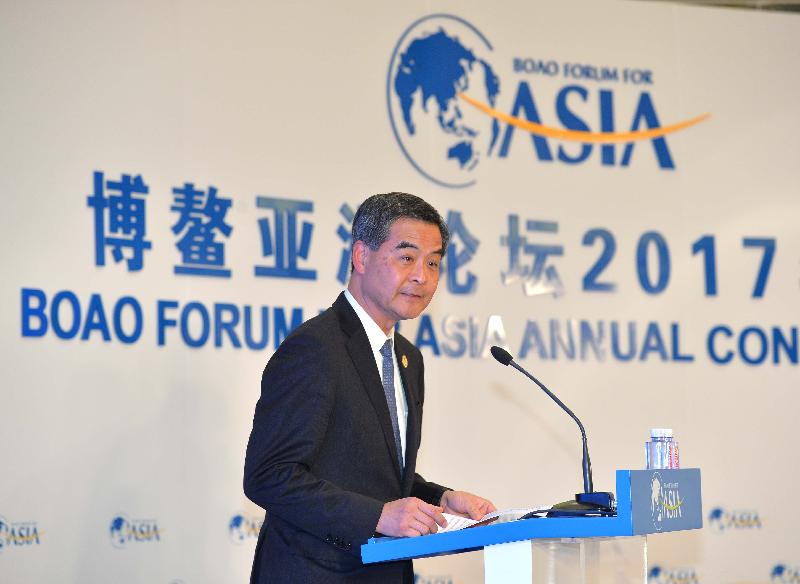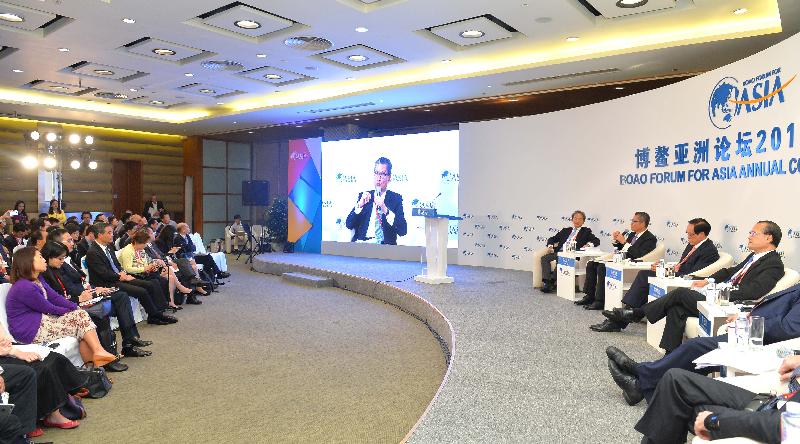Speech by CE at Boao Forum for Asia Annual Conference Hong Kong Sub-forum (English only) (with photos/video)
******************************************************************************************
Jack (Chairman of the Airport Authority Hong Kong, Mr Jack So), distinguished panellists, ladies and gentlemen,
Good afternoon. It gives me great pleasure to be here today, to share with you Hong Kong's perspective, and our experience, in globalisation and free trade.
These two realities are, to be sure, closely related. Free trade helps create a globalised economy, where finished products often comprise materials and components from different parts of the world. Trade also grows faster, and easier with global economic integration - thanks to the expedited flow of goods, services, capital, people, knowledge and technology across borders.
Hong Kong has always been a staunch supporter of free trade. Article 115 of the Basic Law, our mini-constitution, stipulates that Hong Kong shall, and I quote, "pursue the policy of free trade and safeguard the free movement of goods, intangible assets and capital." Unquote. There are no tariffs on goods entering Hong Kong. And we do not subsidise our exports. We offer a level playing field for all companies - local or foreign, large or small. It is no surprise that Hong Kong has been ranked the freest economy in the world for the past 23 years in a row by the Washington-based Heritage Foundation.
If there is one thing that Hong Kong can share on global economic development, it would be Benjamin Franklin's insight that "no nation was ever ruined by trade, even seemingly the most disadvantageous". Free trade, after all, is the framework upon which our prosperity rests.
Hong Kong, with an area of only 1 100 square kilometres, has little natural resources. But that turned out to be a blessing in disguise, for we have little choice but to invest in our people, technology and, no less importantly, trade and commerce, which in turn depends on regional and international connections and connectivity.
We started out as an entrepôt in trade between the Mainland of China and other parts of the world, then an international trade centre offering all kinds of commercial, financial and professional services. Today, Hong Kong is the world's seventh-largest exporter of merchandise trade and the 14th largest exporter of commercial services. Last year, the total value of trade in goods came in at US$974 billion, and total trade in service amounted to US$172 billion. Trading and logistics contributes 22 per cent of Hong Kong's GDP, employing about 750 000 people.
So because of trade - free trade - we have been able to punch above our weight. Our experience clearly shows that free trade not only creates wealth and jobs, it also promotes innovation and competition, encourages savings and investments, and enables more goods and services to reach consumers at lower prices. It is no coincidence that Hong Kong is hailed as Asia's "shopping paradise", as well as the world's second largest recipient of foreign direct investment.
We will continue to uphold free trade. All the more in the age of globalisation and technology, where people, societies and businesses are increasingly bound together, fostering international collaboration and specialisation, as well as lowering transaction costs across national boundaries. While there may be temporary aberrations and setbacks for domestic political play, we believe that longer-term, trade globalisation is an irreversible trend.
As a founding member of the World Trade Organization, Hong Kong has always been an active member of the multilateral trading system. And, under "one country, two systems", "Hong Kong people administering Hong Kong" with a high degree of autonomy, we are empowered by the Basic Law to pursue trade agreements with our trading partners. Article 151 allows us to conclude and implement agreements with foreign economies and international organisations in economic, trade, financial and other fields.
We are now deep into Free Trade Agreement negotiations with ASEAN - the Association of Southeast Asian Nations - our second-largest trading partner after the Mainland of China.
As for Investment Promotion and Protection Agreements, we concluded IPPAs with Canada and Chile last year, bringing the number of IPPAs signed by Hong Kong to 19. We initialled a draft text with Mexico this January, and are looking to negotiating IPPAs with Iran and Russia.
In support of our efforts to advance trade co-operation with the world, the Hong Kong Government is expanding its network of overseas representation, in the form of Economic and Trade Offices (ETOs). Last year, we set up an ETO in Jakarta, where the ASEAN secretariat is located. This year, we will open an ETO in Seoul. And we have begun work on establishing ETOs in India, Mexico, Russia, South Africa and the United Arab Emirates. Our goal is to take the number of ETOs in foreign countries from 11 - the number when I took office four and a half years ago - to a total of 18.
Meanwhile, our Trade Development Council and Invest Hong Kong, with offices around the world, serve to promote Hong Kong as a global trade and investment hub through regular business fairs, conferences and visits.
We continue to reach out to the world in trade, because we know that trade liberalisation expands economic opportunities. In recent years, however, some economies have turned to restrictive trade measures in the wake of anti-globalisation sentiments and economic difficulties at home.
Protectionism is never the answer. High tariffs can only protect domestic industries for so long. In the long-term, protectionism hurts the economy. Productivity will decline, innovation will be strangled without competition, goods and services will be more expensive, real wages will decrease, and standard of living will drop.
As President Xi Jinping said at the World Economic Forum in Davos earlier this year, and I quote, "Pursuing protectionism is like locking oneself in a dark room. While wind and rain may be kept outside, that dark room will also block light and air. No one will emerge as a winner in a trade war." We must, said President Xi, "remain committed to developing global free trade and investment, promote trade and investment liberalisation and facilitation through opening-up and say no to protectionism." Unquote.
Such commitment was, I am glad to note, shared among global economic leaders at the APEC Economic Leaders Meeting in Peru last year, where leaders of the 21 member economies - including Hong Kong, China - pledged to "support free and open trade and investment", and to "resist all forms of protectionism".
Indeed, the solution to domestic economic difficulties lies not in palliative trade distorting measures, but in finding new ways to grow the economy, in creating new industries and better-paid jobs, in helping domestic industries adapt and upgrade, and in building a fairer system for distributing globalisation gains.
Hong Kong, rest assured, will continue to work with the world in furthering trade liberalisation - not only for the benefit of ourselves as a free trade economy, but of all countries and all peoples who can, and will, profit from the wellspring of opportunity and prosperity that comes with free trade and globalisation. Hong Kong's experience - Hong Kong's success - is the most compelling testimony.
Thank you.
Ends/Friday, March 24, 2017
Issued at HKT 16:25
Issued at HKT 16:25
NNNN




